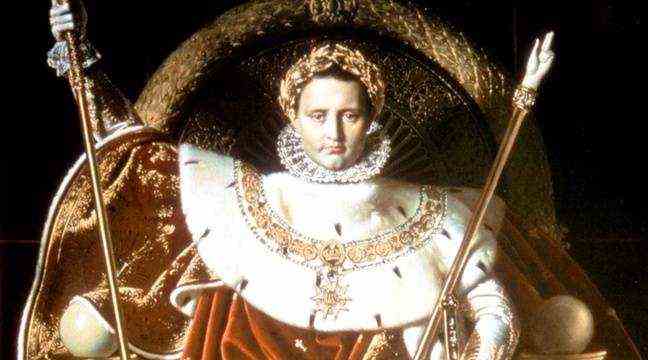“Napoleon Bonaparte on the Imperial Throne” (painting painted by Ingres in 1806) – GOLDNER / ERL / SEGUIN / SIPA
May 5, 1821. Napoleon dies at the age of 51 far from his family and his country in Saint Helena, a lost island in the South Atlantic where the British sent him into exile after his last defeat at Waterloo. 200 years later, Emmanuel Macron will lay a wreath on Wednesday afternoon at the foot of the Emperor’s tomb, under the majestic dome of the Invalides. Just before, the Head of State will deliver a speech at the Institut de France to “look in the face” this “complex being” that was Napoleon, by being “neither in hagiography, nor in denial, nor in repentance, ”indicates the Elysee.
The exercise is delicate. Because this “major figure in History” has “always been contested”, recalls the Institute. And it continues to ignite the debates between its defenders, who celebrate the military strategist and the initiator of the “modern state”, and its critics, who accuse him of having caused hundreds of thousands of deaths during his campaigns. military personnel and reestablishing slavery.
“Look in the face” the History of France
Faced with such a controversial legacy, the heads of state have refrained from taking a position on Napoleon since Georges Pompidou celebrated in 1969 the bicentenary of his birth in Ajaccio, his hometown. “There is no name more glorious than that of Napoleon. Starting from nothing, stripped of everything, he obtained everything, ”summed up the Gaullist president.
By daring to mark this anniversary, Emmanuel Macron “does not shy away”, says the Elysee. By underlining his will to “look in the face” the History of France, whether it is on Napoleon or on the action of France in Algeria and Rwanda, the two delicate memorial files which it seized.
“To commemorate means to remember together, but not to honor”, specifies historian Frédéric Régent. “Thanks to this commemoration, most French people will learn that Napoleon restored slavery” in 1802, eight years after its abolition, added this specialist in colonial history on
Franceinfo. In his speech, Emmanuel Macron “will say that slavery was an abomination, including in the context of the time”, according to the Elysee.
This condemnation is particularly awaited in Guadeloupe, Martinique and in Reunion, where many inhabitants are descendants of slaves. “No victim can celebrate his executioner, unless he is alienated and crazy to bind”, affirm the International Committee of Black Peoples, the FKNG, and the International Movement for Reparations (MIR) which denounce, in a press release, tributes to a “liberticidal racist”.
Heavy human toll of its military campaigns
In the other negative points of the Napoleonic heritage, the Head of State could point out the enormous human toll of his military campaigns, like that of Russia, and the coup d’etat of “18 Brumaire” which marked the 9 November 1799, the end of the French Revolution. At the same time, the Head of State should greet Napoleon as the organizer of the modern state with the creation of the Civil Code, high schools, the Court of Auditors, the Council of State or prefects …
On the political level, the debate on the advisability of commemorating Napoleon remained muted, marked by some critics of elected officials from the left, who regret the absence of celebration of the 150 years of the Commune by the president, while on the right some would have liked to give more scope to the anniversary. Marine Le Pen hailed “the greatness” of the emperor and regretted Tuesday that Emmanuel Macron “commemorates in a hurry” the one who “has done so much for the country” and “given so much to the world”.
Bearing witness to the fascination that the Emperor still arouses, the bicentenary is the occasion for the release of a multitude of new works on Napoleon, to which thousands of essays and novels have already been devoted. Announced as one of the stars of the cultural season, “The Napoleon exhibition”, which retraces the major stages of his life, will welcome the public at the Grande Halle de La Villette from May 19, the day the museums reopen. .

